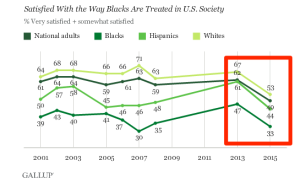I want what the Black Lives Matters (BLM) movement wants.
Police body cameras? Yep. Punishment and removal of police officers who are abusive and/or are engaged in racial profiling? It’s about time. Prosecution of police offers who break the law? Yes. More diverse police forces? Definitely. Better training in deescalation techniques for police officers? Badly needed. Less draconian drug laws? Amen. More white awareness of examples of disgraceful racially based abuses in the law enforcement system? Absolutely.
Black Lives Matters is on the right track, and I’m with them.
But when it comes to disruption of community events that have nothing to do with racial discrimination in the law enforcement system, BLM loses me and a lot of other sympathetic citizens. Legal authorities can determine the extent to which such disruption is permissible, but my question is whether it is persuasive.
Protesting at the scene of an incident of police abuse is persuasive, because it shines a light squarely on an example of abuse. Just as sit-ins at segregated diners forced white America to open their eyes to the injustice of Jim Crow laws, shining a light directly on undeniable examples of police abuse is having a profound effect on white opinions.
 For instance, between 2013 and 2015, Gallup finds a 14-point increase in the number of white Americans who are not satisfied with the way blacks are being treated. Another poll finds that an overwhelming 89% now support the use of police body cameras.
For instance, between 2013 and 2015, Gallup finds a 14-point increase in the number of white Americans who are not satisfied with the way blacks are being treated. Another poll finds that an overwhelming 89% now support the use of police body cameras.
Black Lives Matters is starting to win, and that’s very good for our country.
But disrupting community activities that have nothing to do with police abuse – fairs, commutes, and sporting events — effectively is spotlighting disruption more than discrimination. Because the disruptions are unpopular, I worry that the tactic will result in fewer allies for police abuse reforms. If the ultimate goal of BLM is to change the law enforcement system so that it better protects black lives, rather than to simply get on the news, disrupting non-discriminatory community gatherings strikes me as self-defeating.
The Saint Paul BLM chapter apparently is planning to disrupt this weekend’s Twin Cities Marathon, an uplifitng community event that is not the least bit connected to the issue of racial bias in the law enforcement system. This is of particular interest to me, because my son has been training for months to run his first marathon that day, and I’ve been looking forward to a 10-mile run. The protest could change all of that.
To be clear, I am keeping this in perspective. Seeing my son have his dream of completing a marathon taken from him is obviously nothing compared to black parents seeing their children have their dignity, dreams and lives taken from them due to our discriminatory law enforcement system. I get that. But such disruptions of community events do feel unfair, unnecessary and unfocused to a lot of citizens, and I fear public resentment of the tactic will inadvertently set back a very important cause.

I agree. . .the strategy is impolitic.